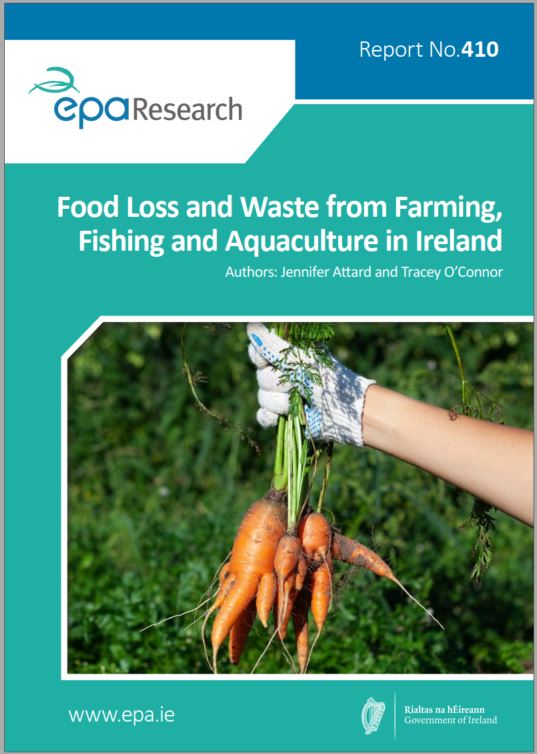Research 410: Food Loss and Waste from Farming, Fishing and Aquaculture in Ireland
Authors: Jennifer Attard and Tracey O’Connor
Summary: Food waste in Ireland has been estimated at 1.1 million tonnes per year, but this excluded farming, fishing and aquaculture (i.e. primary production), as there were no data on these sectors. This research has quantified and understood food waste in primary production and is a starting point in identifying areas that need addressing. The project has compiled various options for solutions available to tackle the specific food waste issues occurring in Ireland.

Project Highlights
Watch the project highlights video
Identifying Pressures
Food waste in Ireland has been estimated at 1.1 million tonnes per year, but this excluded farming, fishing and aquaculture (i.e. primary production), as there were no data on these sectors. This research has, for the first time in Ireland, quantified and understood food waste in primary production, and is a starting point in identifying areas that need addressing. The study found that 189,500 tonnes of food is lost or wasted each year in primary production, with significant issues arising in horticulture because of conditions in contracts with retailers and a lack of ecological farming methods, resulting in the average waste of some vegetables reaching 40%. The increasing population requires Ireland to produce 25% more food by 2050. This poses challenges; for example, the agricultural sector alone is already responsible for 33% of Ireland’s greenhouse gas emissions (although a goal has been set to decrease these emissions), exploiting land for intensive food production has led to soil degradation and an increase in overfishing has put several species at risk. Furthermore, food waste is a social and public health issue, as food poverty is experienced by 9% of the Irish population.
Informing Policy
The European Commission requires countries to report on their food waste volumes by 2022, including at the primary production level. Food waste measurement is an essential starting point for food waste reduction. In Ireland, government policy states that the current target is to have an overall food waste reduction of 50% by 2030, reflecting EU ambitions articulated in the Farm to Fork Strategy and circular economy legislation. This is also in line with target 12.3 of the UN’s Sustainable Development Goals, which states that there must be a reduction in food losses along production and supply chains, including post-harvest losses. Primary production food loss and waste has therefore been investigated and quantified in this report. In addition, the project team has embarked on an in-depth review of the global policies and strategies in place to reduce food losses and waste. These have been compiled in this report, along with recommendations for those solutions that were deemed to be the best suited to Irish production conditions.
Developing Solutions
The waste hierarchy orders waste mitigation methods from most favourable to least favourable, in the following series: prevention, reuse (human consumption), reuse (animal feed), reuse (by-products), recycle (food waste), recycle (nutrient recovery), recovery (energy) and disposal. The project has therefore focused solely on prevention (or minimisation) of food waste and has excluded actions that divert waste to any application other than for food. The project has compiled various options for solutions available to tackle the specific food waste issues occurring in Ireland. These solutions have been designed to make use of various different types of capital: human, social, natural, physical and financial. These solutions gathered from both stakeholder interviews and the literature, were further grouped, resulting in three recommendations:(1) maximising implementation of widely endorsed low-food-loss and low-waste-production strategies (embedding low-food-loss and low-waste-production practices); (2) enhancing efficiency through sustainable intensification of production (sustainable intensification); and (3) total value chain and landscape-level organisation and intervention to achieve change in the socio-ecological context of primary production food loss and waste (disrupting food production dynamics).
https://www.epa.ie/media/epa-2020/research/epa-funded-research/Report-cover-410.jpg